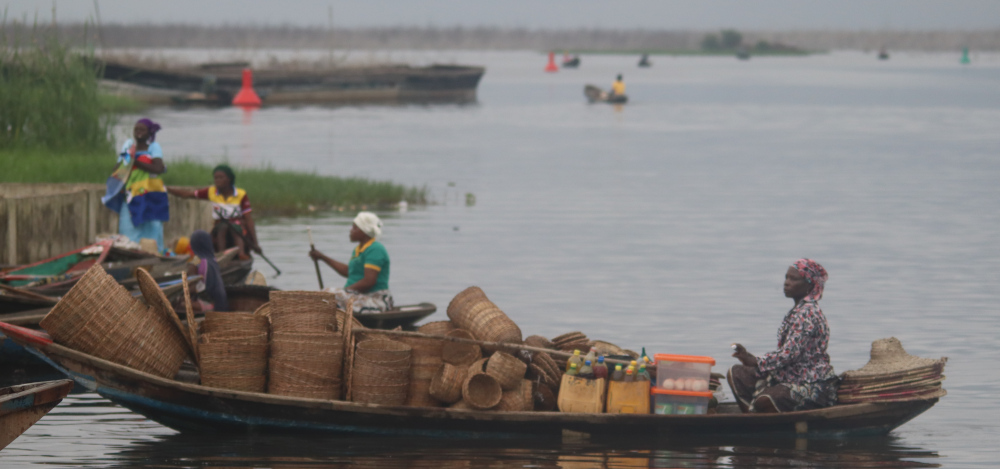Describe your organisation, its vision and mission.
Today’s pressure on the natural ecosystem harms its ability to generate essential goods and services for local communities, which results in considerable economic and social consequences, affecting the most vulnerable communities. The Benin Environment and Education Society (BEES) is a member of the International Union for Conservation of Nature (IUCN), based in Benin, and we work for the protection of the environnment and the sustainability of natural resources. To achieve the goal of conservation, restoration and sustainable management of coastal ecosystems, BEES implements actions guided by three main objectives:
- Improve and apply knowledge mostly innovations and practices of indigenous to support the conservation and restoration of aquatic ecosystems.
- Empower civil society and community members to engage in decision-making and management that conserves and restores aquatic ecosystems.
- Lobby and advocacy to enhance coastal governance and promote integrated management projects and programmes that are ecologically and socioeconomically sound for community welfare.
How long has BEES been a GWP partner?
Integrated Water Resources Management (IWRM) is a management method that integrates several components of the natural system (soils, fauna, flora, etc.) and the human system (population growth, economic growth, etc.). It is therefore part of a sustainable development model. The Benin National Action Plan for Integrated Water Resources Management (PANGIRE) formalizes Benin's political vision on water in order to make it a real lever for poverty reduction and sustainable economic development. Unfortunately, despite these commitments made by Benin, particularly in the framework of the operationalisation of IWRM, the threats to aquatic ecosystems are increasing.
So, there is a need of urgent action to prevent the progressive loss of wildlife habitat, the congestion and eutrophication of waters. Also, cooperation between different organisations working on IWRM deserves to be strengthened. We decided to join GWP in 2012 and work together to influence policy formulation and implementation and promote Sustainable River Basin Management in Benin.
What are the benefits of being a GWP Partner?
BEES, together with other NGOs, is active in the protection and monitoring of birds and threaten species, in the wildlife habitat protection and in local development. Although these NGOs are well represented in the field, their activities do not cover the extent of the whole ecosystem and above all do not impact the major effects of the degradation of the biological resources.
But with the help of GWP Benin, we make use of the global stakeholder platform to lobby and make our voice heard by decision makers. Together, we are the Delta Alliance Benin Wing, a member of Delta Alliance International, working together with international agencies to improve the resilience of the Benin’s deltas. This helps us to have access to a wide and diverse expertise that we can benefit from to solve local problems.
Please share a challenge facing the management of water resources in your area of expertise.
The main problem in aquatic ecosystems management is the pollution of soil, water resources, fish species and the resulting water diseases.
Indeed, studies have shown that through runoff water, quantities of synthetic chemicals are discharged into cotton fields from upper and middle basins, and pollute the Ouémé surface water and groundwater. This pollution affects both crop soils and fish species.
Moreover, the excessive use of fertilizers and plant protection products in the delta rice fields also contributes to this pollution. Thus, the rational use of our aquatic ecosystems must consist of sustainable exploitation benefiting the bordering catchment communities in Benin and neighbouring countries. Exploitation levels that are compatible with safeguarding the delta ecosystem properties and carrying capacity.
Are there any special projects or initiatives that you would like more widely known?
"Support for the creation of the Grand Nokoué Inter-Community Reserve (RIGN)", implemented by BEES as part of the Ouémé Lower Valley Biosphere Reserve.
The lower Ouémé delta (Lake Nokoué, the Porto Novo lagoon and the Ouémé and Sô rivers) or the "Grand Nokoué" complex of the RAMSAR 1018 site is Benin’s largest wetland complex in terms of biodiversity and one of the largest lagoon complexes in West Africa.
However, the increasing escalation in the development of natural resources by a growing local population poses a major risk of resources scarcity and decline. The impact of these various pressures on the ecosystem is reflected in the gradual disappearance of species of flora and fauna (especially mangrove and fish species), a gradual drying up of floodplains and a degradation of shorelines because they have to be cleared for fisheries.
Moreover, there is a significant reduction of spawning grounds, and silting increase through solid deposits due to erosion of soils in the watershed. The project "Support for the creation of the Grand Nokoué Inter-community Reserve (RIGN)" of the FFEM/IUCN-CF PPI programme and IUCN-NL will help the establishment in the main municipalities of more effective mechanisms for the management of wetland ecosystems.


